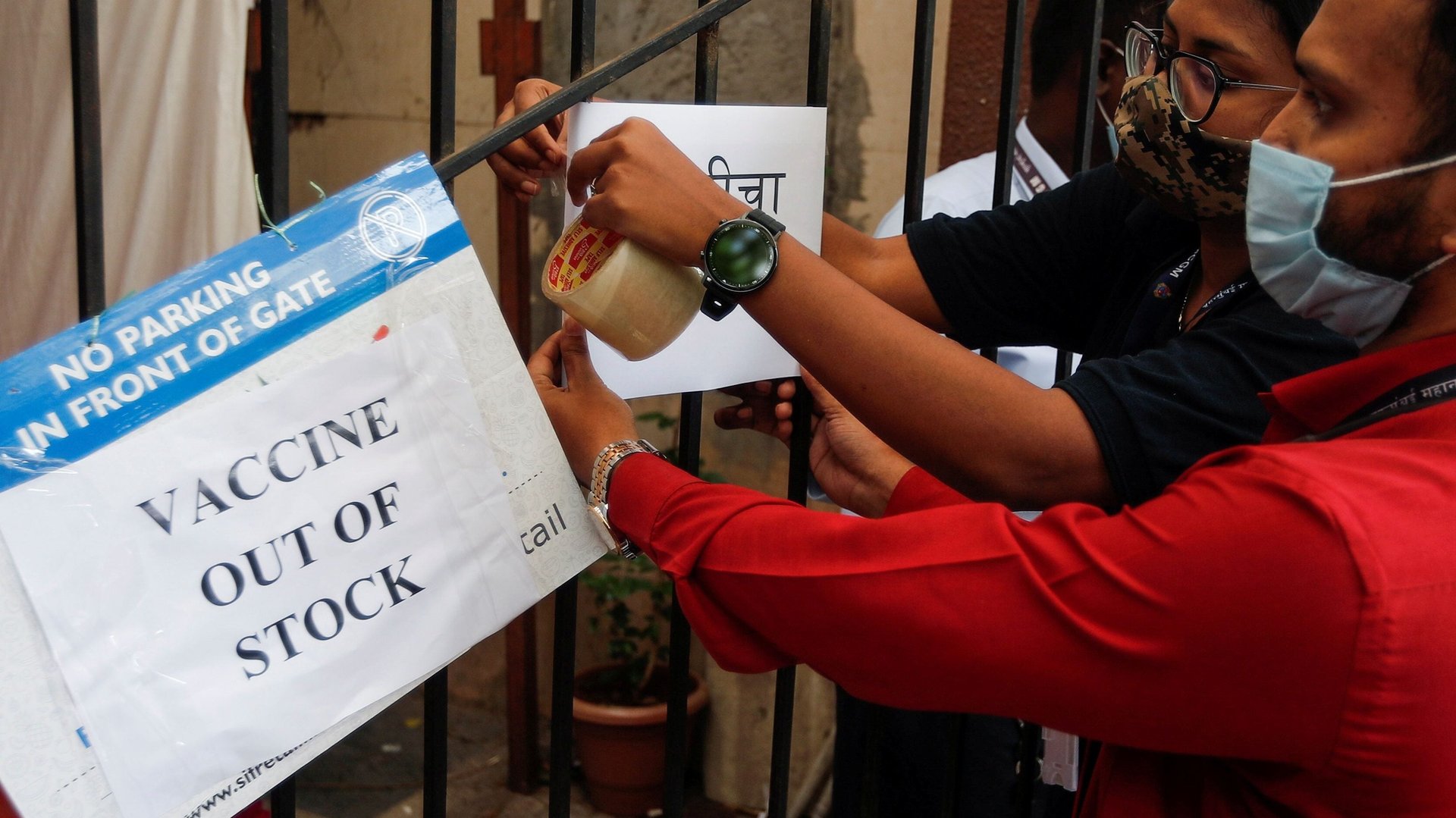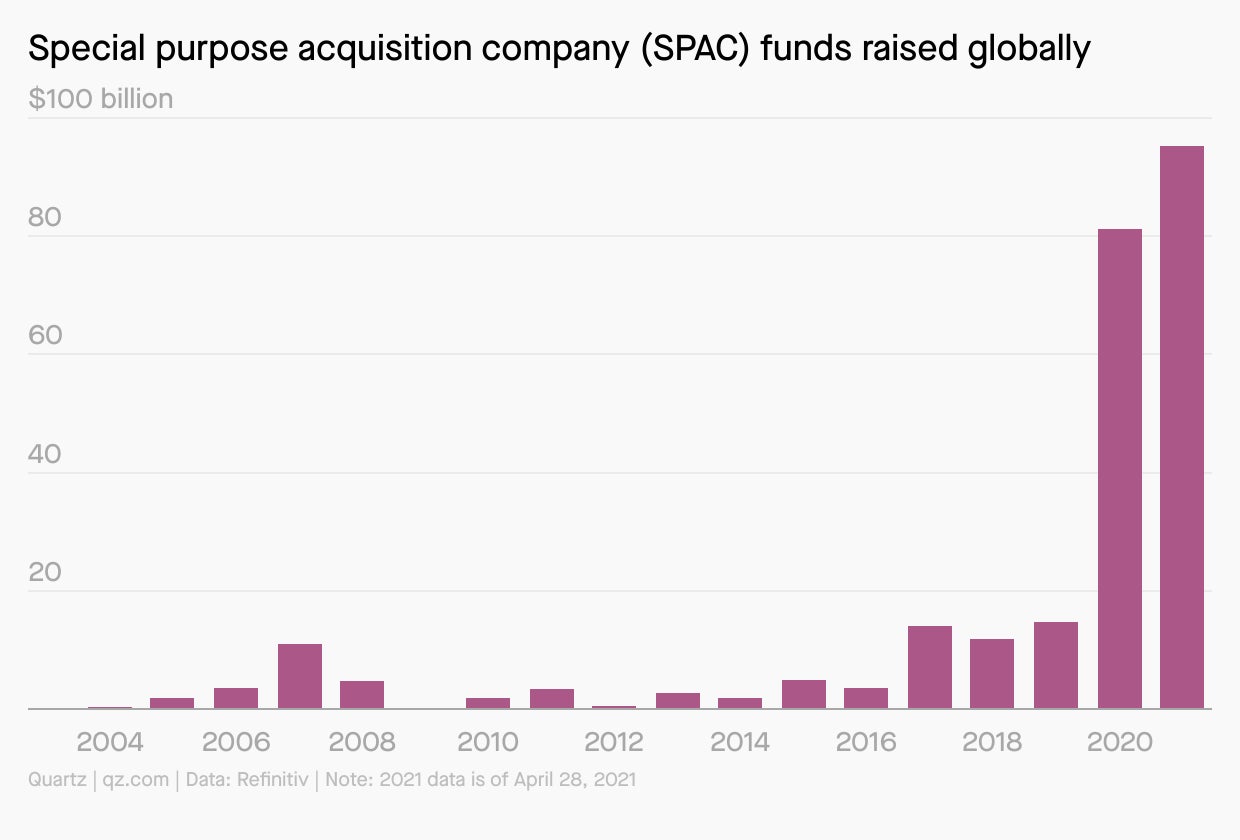Weekend edition—India’s vaccine paradox, chip shortage, butt implants
Good morning Quartz readers,


Good morning Quartz readers,
For years, India has made and exported more vaccines than any other country. Yet its vaccination drive against Covid-19, which began in early January, is stumbling and faltering.
To this observation, the most obvious response is that India’s population is huge and scattered, that reaching 1.39 billion people is a complicated, time-consuming task. True enough, though the government’s mode of vaccine delivery—its maze of crashing apps, differential pricing, unclear messaging, and patchy record-keeping—is still cause for worry. But the real problem is the alarming shortage of vaccines. This week, India opened up vaccinations to over-18s, but most states didn’t have enough stock to offer shots. Adar Poonawalla, the CEO of the Serum Institute of India (SII), the world’s biggest vaccine manufacturer, has warned that the supply crunch will continue for another three months.
On the ground, people are being turned away from vaccination centers because the shots are out of stock. In Mumbai, the city corporation suspended vaccinations altogether for three days. Other states postponed their plans to vaccinate citizens aged 18-45. As of this week, only 28.9 million Indians had received both their doses. Around 200 million are awaiting their second shot, and 600 million are eligible for their first one.
Why is India, the vaccine factory to the world, unable to find enough vaccines for its own people? There is no single answer, but tracking events over the past year reveals a timeline of dysfunction: a period in which government negligence, corporate profiteering, opaque contracting, and the inequities of the global pharma market combined to bring India to this moment of vaccine crisis. Millions of Indians are relying on global awareness of their situation before progress can be made. Get some conversations going this weekend after spending 15 minutes with Samanth Subramanian’s tick-tock of a vaccine rollout gone wrong.

Five things from Quartz we especially liked
What diapers and semiconductors have in common. So much coverage of the chip shortage has focused on the chips, demand for which is soaring as gadgets take over our lives. But a concept known as the “bullwhip effect” helps explain the shortage part: how even minor shifts in demand can whipsaw companies up and down a supply chain. Nicolás Rivero breaks it all down; I will never look at a rodeo the same. —Kira Bindrim, executive editor
An African startup attracts talent by focusing on employee equity. Employee stock ownership plans are uncommon at African startups, where equity is more likely to be in the hands of founders and some top executives. Recognizing their draw for prospective talent, e-commerce platform Sokowatch first began offering stock ownership to staff in 2018. It now covers more than 500 employees, Carlos Mureithi reports, and believes its approach could help startups looking to retain tech talent and spur innovation. —Jackie Bischof, talent lab editor
India’s data lapses are nothing new. One way to tell what a country cares about is to look at what it counts—tracking and data collection are the first step to monitoring progress and wellbeing, and fixing what isn’t working. By this measure, there is little the Indian government has cared about in the past few years. This has become sorely clear with the shortage of reliable data on Covid-19 deaths, but as Prathamesh Mulye highlights in his story, it’s an issue that predates and is much broader than the pandemic. —Annalisa Merelli, reporter
Empathy distress. Are you someone who feels too much, or who regularly attracts friends in need who feast on your empathy? It’s exhausting. Sarah Todd reports on the phenomenon known as empathy distress, and offers helpful tips on how to keep the accompanying burnout at bay without losing your grace and humanity. —Heather Landy, executive editor
China is deploying girl bands to fight Covid-19. The Chinese government has an odd vaccine messaging problem on its hands: Many people feel there’s no point in getting the shot because the government has done such a good job containing the virus. Jane Li explains how health officials are trying to drum up enthusiasm through rewards like store coupons, aesthetic upgrades to vaccinated people’s health status QR codes, and special stamps from hit girl band SNH48. —Nicolás Rivero, reporter
One membership thing that made us 📈
The purpose of a special purpose acquisition company (SPAC) is to acquire an as-yet unidentified private company, taking it public through the merger process. SPACs were all the rage this year, but nobody thinks the SPAC mania can continue the way it has.

✦ Company founders have more ways to go public than ever before. Our field guide to the future of the IPO shows how power is shifting from Wall Street to management. Stay up to date on all the ways business is changing with a Quartz membership. Try one free for a week.
We’re obsessed with Rasputin

The wrong man for the job. The pairing of charismatic Russian mystic Grigori Rasputin and the Romanov family, led by Nicholas II and his wife Alexandra, the last monarchs to rule over Russia, has embedded itself into legend precisely because it was so explosively disastrous. Time and counsel could have turned the young, unprepared Romanovs into effective heads of state. Instead, they put their faith in a drunk sex addict. Stumble through history with the Quartz Weekly Obsession.
Get the Weekly Obsession email sent to your inbox, for free!
How to master the art of connecting and networking. The internet promised to bring us closer together, but building networks and authentic professional relationships in many ways seem harder than ever. In our next virtual workshop, we’ll hear from experts on where to find people who can help you in your career, the art of reaching out, and ways to pay things forward. Whether you’re looking for a mentor, a job referral, an “in” at a prospective employer, or a connection with curious-minded people like yourself, you will find something to learn in this workshop. Join us May 13 from 11am-12pm US eastern time.
Five things from elsewhere that made us smarter
Covid-19 is a defining moment for the city of London. The British capital was hit harder by the virus than anywhere else in the UK and has also suffered from rising unemployment and an exodus of migrants tied to Brexit. Can it do what it has so successfully done before, and reinvent itself to not just survive but also thrive in a post-Covid world? The Financial Times’ William Wallis provides some clues. —Annabelle Timsit, reporter
The unlikely yet eerie similarity between Mao and Modi. As India’s Covid-19 crisis continues, so does the ruling government’s fixation on state strength and the cult of Modi. Writing for the Indian Express, Brown University social sciences professor Ashutosh Varshney draws on political history to tug at the common thread between right-wing and left-wing regimes: the indifference to mass suffering. But Varshney observes that despite historical similarities, Narendra Modi differs greatly from Mao Zedong in that left-wing governments use violence to serve the poor—and in Modi’s India, that doesn’t seem to be the case. —Manavi Kapur, Quartz India reporter
Tax and tax, and spend and spend, and elect and elect? This FDR-era credo is driving US president Joe Biden’s economic agenda, this time around with a special focus on racial inequality. It’s a big departure in approach from his Democratic predecessors in the White House, who heralded education as the best way out of poverty. Economists on the left are elated—though it’s unclear how happy voters will be, writes the Atlantic’s Ronald Brownstein. —Ana Campoy, deputy finance and economics editor
A different kind of magic mushrooms. It sounded like an easy climate change fix with a potentially huge impact: Homegrown mushroom kits, designed to be sprayed over suburban lawns, each with the potential to pull tons of carbon dioxide from the air. Too bad the whole thing was a scam, perpetrated by a vindictive entrepreneur. At a time when climate tech startups are drawing millions in venture capital, BuzzFeed’s Zahra Hirji has a rollicking tale of con artistry and the perils of too-good-to-be-true solutions. —Tim McDonnell, reporter
Butt implants are the big winner of Covid-era cosmetic surgery. Americans got fewer nips and tucks overall in 2020, but demand for butt implants rose 22% from the previous year. Why the swelling (heh) of interest in a rounder tush? Bloomberg’s Aja Mangum and Mark Glassman suggest that all that time stuck at home may have led to a “general flattening of the buttocks”—plus lots of downtime scrolling Instagram for Kardashian-esque inspiration. —Sarah Todd, senior reporter
Our best wishes for a relaxing but thought-filled weekend. Please send any news, comments, IPO alternatives, and girl band stamps to [email protected]. Get the most out of Quartz by downloading our app and becoming a member. Today’s Weekend Brief was brought to you by Liz Webber.